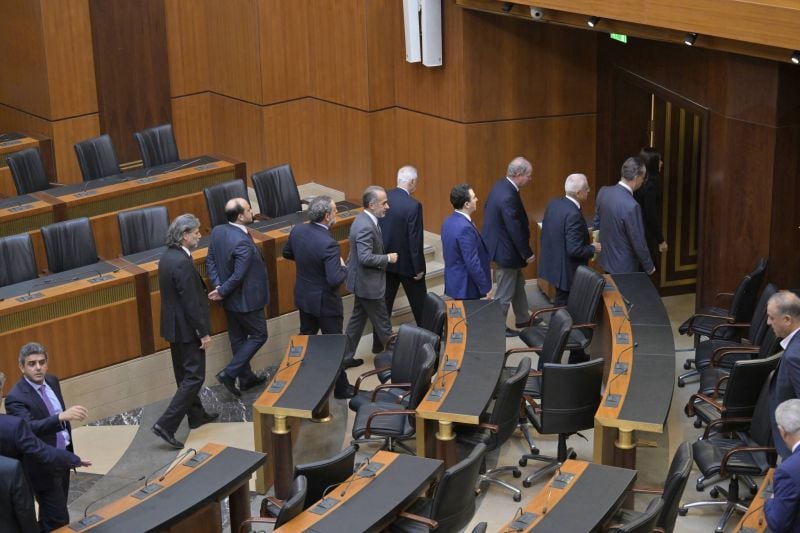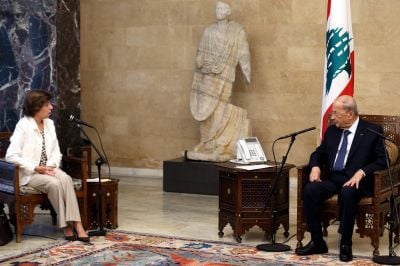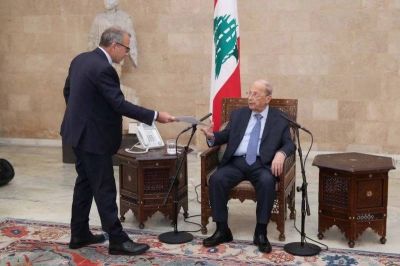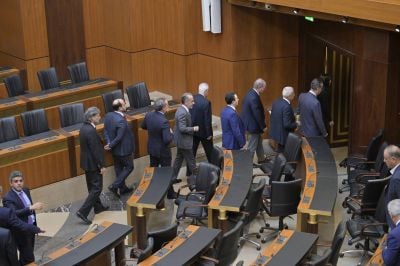
The deputies of the Lebanese Forces leave the assembly after the postponement of the electoral session, due to lack of quorum, on Oct. 13, 2022. (Credit: An-Nahar)
“It is a waste of gasoline for nothing.”
This ironic remark by MP Paula Yacoubian sums up the parliamentary session that was supposed to be held on Thursday to elect a new president but was rescheduled to Oct. 20, due to a lack of quorum.
This political weapon has been used for 40 years, although the Constitution makes no clear reference to the number of MPs required to hold a session. According to the unwritten rules of the game, 86 MPs must be present to convene a parliamentary session. The same number of votes is required for a candidate to be elected president in the first round of voting. In the second round, just 65 votes are sufficient.
On Thursday, several groups boycotted the parliamentary session, including some members of Hezbollah, the Amal Movement, the Free Patriotic Movement (FPM) and Tashnag. These groups repeated a similar scenario to the first session, held Sept. 29, with a few added nuances.
First, Hezbollah and its allies prevented quorum before the ballots were even cast, making it clear that it is not yet time for an agreement. The traditional opposing camp will not be able to get its president elected in a Parliament with a narrow majority if a quorum cannot be reached, and the standoff will endure.
Second, Hezbollah showed solidarity with FPM leader Gebran Bassil, whose outrage was expressed in the press when he learned that the presidential election parliamentary session was scheduled for Oct. 13 — a symbolic date for the FPM party and its founder Michel Aoun.
Third, Hezbollah stopped the opposition candidate, Michel Moawad, from potentially improving his score and gaining more votes.
The agreement, again and again
The FPM kicked off the boycott. Bassil responded when Berri chose a date that coincided with the commemoration of the Syrian assault on the Baabda Palace, where General Michel Aoun — then head of the transitional government — was based in 1990. Hezbollah used the same argument.
Uncertainty loomed as it was unclear whether Hezbollah’s 15 MPs would participate in the meeting. Some MPs for the Iran-backed party entered the Parliament but went to their offices rather than to the assembly. Only four members of the party showed up to the parliamentary session.
Hezbollah was not the only one to play this double game. It also counted on its traditional partner, Berri’s Amal Movement. Although Berri scheduled and confirmed the session would be held despite the objection of a large Christian parliamentary bloc, some MPs from Berri’s bloc contributed to the lack of quorum.
“A majority of the bloc’s members entered Parliament,” Amal MP Mohamed Khawajah told L’Orient-Le Jour. He added, “The lack of quorum is a democratic tool that could be used until an agreement is reached.”
For Hezbollah and Amal, the equation is now clear: There will be no quorum in the absence of an agreement. Unable to impose a candidate and unwilling to reveal all their cards, the two political parties are finding their way forward.
“We do not want to be part of a dynamic focused on a defiant candidate,” said Hezbollah MP Rami Abou Hamdan, in reference to Michel Moawad, who received support from the Lebanese Forces (LF), the Kataeb and the Progressive Socialist Party (PSP) in the first round of voting.
The pro-Hezbollah March 8 camp is therefore determined to block the plans of the opposing camp, which takes a confrontational approach to the election of a president. “What is needed is a president who comes as part of an agreement,” Abou Hamdan said.
“As long as there is no compromise, the ruling class will torpedo any session, as has always been the case,” Halimé El Kaakour, a Forces of Change MP, told L’Orient-Le Jour on the sidelines of the session.
The Forces of Change bloc cast their first round of ballots for Murex co-founder Selim Eddé, who is also a shareholder of L'Orient-Le Jour.
“It is shameful that [the ruling class] manage to agree with the enemy [in reference to the border demarcation deal] and fail to elect a president,” said Oussama Saad, independent MP for Saida.
‘Serious’ candidate
For his part, Moawad insists on his candidacy, despite the announced veto of the opposing camp.
“I am a candidate who has a clear position. I am the president of the return to the state,” he said Thursday while leaving the Parliament.
But Moawad is not out of the woods yet. He also has a lot of work to do within his camp.
Moawad is struggling to convince the protest movement’s MPs and those of Akkar. The latter, who are mostly Sunni, were preparing to vote for “the new Lebanon,” likely strategizing that Moawad has little chance of winning as long as he is not part of a broader agreement among the various components of a Parliament.
The Forces of Change MPs insist on not supporting the Zgharta MP because they prefer a figure not affiliated with the traditional political camps. They instead launched an initiative and conducted contacts with all political sides to elect a “rescue president.”
Moawad’s supporters insist he is a “serious” candidate, said Ashraf Rifi, the former general director of the Internal Security Forces and current MP with the Renewal parliamentary bloc.
This position is shared by the Lebanese Forces (LF), which is hostile to any presidential candidate who would result from an agreement with Hezbollah.
“If some people think they can count on time to lead us to candidates like Abu Melhem,” a popular 1970sLebanese TV show character known for solving disputes, “they are mistaken,” said LF MP Georges Adwan.
This article was originally published in French in L'Orient-Le Jour. Translation by Joelle El Khoury.


